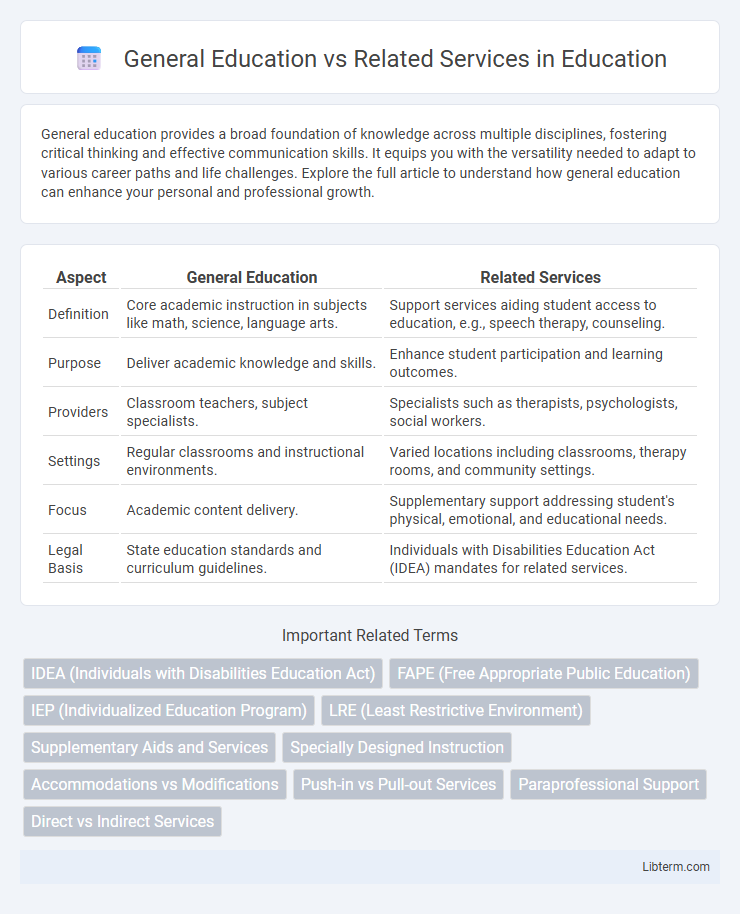General education provides a broad foundation of knowledge across multiple disciplines, fostering critical thinking and effective communication skills. It equips you with the versatility needed to adapt to various career paths and life challenges. Explore the full article to understand how general education can enhance your personal and professional growth.
Table of Comparison
| Aspect | General Education | Related Services |
|---|---|---|
| Definition | Core academic instruction in subjects like math, science, language arts. | Support services aiding student access to education, e.g., speech therapy, counseling. |
| Purpose | Deliver academic knowledge and skills. | Enhance student participation and learning outcomes. |
| Providers | Classroom teachers, subject specialists. | Specialists such as therapists, psychologists, social workers. |
| Settings | Regular classrooms and instructional environments. | Varied locations including classrooms, therapy rooms, and community settings. |
| Focus | Academic content delivery. | Supplementary support addressing student's physical, emotional, and educational needs. |
| Legal Basis | State education standards and curriculum guidelines. | Individuals with Disabilities Education Act (IDEA) mandates for related services. |
Understanding General Education
General education refers to the core academic curriculum provided to all students, including subjects like math, science, language arts, and social studies, designed to build essential knowledge and skills. Related services support students with disabilities in accessing this curriculum by providing necessary assistance such as speech therapy, occupational therapy, or counseling, ensuring they can fully participate in the general education environment. Understanding the distinction between general education and related services is crucial for developing effective Individualized Education Programs (IEPs) that promote inclusive learning.
Defining Related Services in Education
Related Services in education encompass specialized support beyond general education to help students with disabilities access and benefit from their learning environment. These services include speech-language pathology, occupational therapy, counseling, transportation, and assistive technology, tailored to meet individual needs. The Individuals with Disabilities Education Act (IDEA) mandates that related services are provided to ensure Free Appropriate Public Education (FAPE) in the least restrictive environment.
Key Differences Between General Education and Related Services
General Education provides core academic instruction to all students, ensuring access to a broad curriculum within standard classroom settings. Related Services support students with disabilities by offering specialized assistance such as speech therapy, occupational therapy, and counseling to enhance educational outcomes. The key difference lies in General Education focusing on curriculum delivery, while Related Services address specific individual needs beyond typical instruction.
The Role of General Education Teachers
General education teachers play a critical role in delivering inclusive instruction that supports students receiving related services such as speech therapy or occupational therapy. They collaborate with special educators and service providers to modify lessons and implement accommodations that address diverse learning needs. Effective communication between general education teachers and related service professionals enhances student progress and fosters a supportive learning environment.
Importance of Related Services for Students with Disabilities
Related Services provide essential support that enables students with disabilities to access and benefit from General Education curricula effectively. These services include speech therapy, occupational therapy, counseling, and transportation, all tailored to meet individual educational needs. Ensuring access to these specialized supports promotes inclusive learning environments and enhances academic, social, and emotional development for students with disabilities.
How General Education and Related Services Collaborate
General Education and Related Services collaborate by integrating specialized support within the classroom environment to enhance student learning outcomes. Related Services such as speech therapy, occupational therapy, and counseling are coordinated with general education teachers to implement individualized education programs (IEPs) effectively. This collaboration ensures that students receive comprehensive support tailored to their unique needs while participating in the general education curriculum.
Legal Framework: IDEA and Educational Rights
The legal framework under the Individuals with Disabilities Education Act (IDEA) mandates that students with disabilities receive education in the least restrictive environment, emphasizing inclusion in General Education settings when appropriate. Related Services, such as speech therapy or counseling, are provided to support the student's access to the general curriculum and help achieve educational goals. IDEA ensures educational rights by requiring Individualized Education Programs (IEPs) that outline the balance between general education and necessary related services to meet each student's unique needs.
Individualized Education Programs (IEP) and Service Integration
Individualized Education Programs (IEPs) play a crucial role in differentiating services provided in general education versus related services, ensuring tailored support for students with disabilities. Service integration within an IEP emphasizes coordinating instructional strategies and therapies, such as speech or occupational therapy, directly into the general education environment to promote inclusive learning. Effective collaboration among educators, specialists, and families enhances the alignment of educational goals and related services, fostering improved student outcomes and engagement.
Benefits of a Combined Approach in Student Success
Integrating General Education with Related Services enhances student success by providing a comprehensive support system tailored to individual learning needs. This combined approach fosters inclusivity, allowing students to access core academic content while receiving specialized therapies, such as speech or occupational services, which improve functional skills and engagement. Evidence shows that students benefit from coordinated interventions that address both educational and developmental goals, leading to higher academic achievement and social-emotional growth.
Challenges and Best Practices in Coordinating Services
Coordinating General Education and Related Services presents challenges such as communication gaps between educators and therapists, conflicting schedules, and varying compliance requirements under IDEA. Effective collaboration practices include regular multidisciplinary team meetings, use of integrated digital platforms for tracking student progress, and individualized service plans aligning academic goals with therapeutic interventions. Emphasizing parent engagement and professional development enhances consistency, ensuring seamless delivery and maximizing student outcomes.
General Education Infographic

 libterm.com
libterm.com